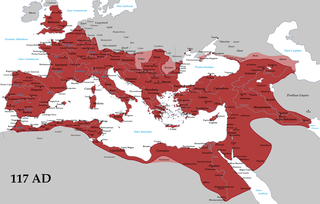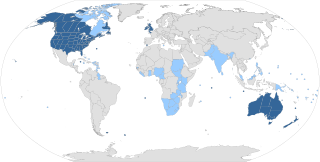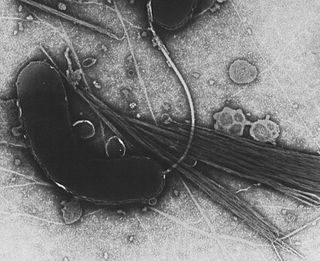
The Bible is a collection of religious texts or scriptures sacred in Christianity, Judaism, Samaritanism, and many other faiths. It appears in the form of an anthology, a compilation of texts of a variety of forms, originally written in Hebrew, Aramaic, and Koine Greek. These texts include instructions, stories, poetry, and prophesies, among other genres. The collection of materials that are accepted as part of the Bible by a particular religious tradition or community is called a biblical canon. Believers generally consider the Bible to be a product of divine inspiration while understanding what that means in different ways.

India, officially the Republic of India, is a country in South Asia. It is the seventh-largest country by area, the second-most populous country, and the most populous democracy in the world. Bounded by the Indian Ocean on the south, the Arabian Sea on the southwest, and the Bay of Bengal on the southeast, it shares land borders with Pakistan to the west; China, Nepal, and Bhutan to the north; and Bangladesh and Myanmar to the east. In the Indian Ocean, India is in the vicinity of Sri Lanka and the Maldives; its Andaman and Nicobar Islands share a maritime border with Thailand, Myanmar and Indonesia.

Joseph Vissarionovich Stalin was a Georgian revolutionary and Soviet political leader who governed the Soviet Union from 1922 until his death in 1953. He held power as General Secretary of the Communist Party of the Soviet Union (1922–1952) and Chairman of the Council of Ministers of the Soviet Union (1941–1953). Initially governing the country as part of a collective leadership, he consolidated power to become dictator by the 1930s. A communist ideologically committed to the Leninist interpretation of Marxism, Stalin formalised these ideas as Marxism–Leninism while his own policies are known as Stalinism.

Nazi Germany, officially known as the German Reich from 1933 until 1943, and the Greater German Reich from 1943 to 1945, was the German state between 1933 and 1945, when Adolf Hitler and the Nazi Party controlled the country, transforming it into a dictatorship. Under Hitler's rule, Germany quickly became a totalitarian state where nearly all aspects of life were controlled by the government. The Third Reich, meaning "Third Realm" or "Third Empire", alluded to the Nazi claim that Nazi Germany was the successor to the earlier Holy Roman Empire (800–1806) and German Empire (1871–1918). The Third Reich, which Hitler and the Nazis referred to as the Thousand Year Reich, ended in May 1945 after just 12 years, when the Allies defeated Germany, ending World War II in Europe.

The periodic table, also known as the periodic table of (the) (chemical) elements, is a tabular display of the chemical elements. It is widely used in chemistry, physics, and other sciences, and is generally seen as an icon of chemistry. It is a graphic formulation of the periodic law, which states that the properties of the chemical elements exhibit a periodic dependence on their atomic numbers.

The Philippines, officially the Republic of the Philippines, is an archipelagic country in Southeast Asia. It is situated in the western Pacific Ocean, and consists of about 7,640 islands, that are broadly categorized under three main geographical divisions from north to south: Luzon, Visayas, and Mindanao. The Philippines is bounded by the West Philippine Sea to the west, the Philippine Sea to the east, and the Celebes Sea to the southwest, and shares maritime borders with Taiwan to the north, Japan to the northeast, Palau to the east and southeast, Indonesia to the south, Malaysia to the southwest, Vietnam to the west, and China to the northwest. The Philippines covers an area of 300,000 km2 (120,000 sq mi) and, as of 2020, had a population of around 109 million people, making it the world's twelfth-most populous country. The Philippines is a multinational state, with diverse ethnicities and cultures throughout its islands. Manila is the nation's capital, while the largest city is Quezon City, both lying within the urban area of Metro Manila.
The number π is a mathematical constant, approximately equal to 3.14159. It is defined in Euclidean geometry as the ratio of a circle's circumference to its diameter, and also has various equivalent definitions. It appears in many formulas in all areas of mathematics and physics. The earliest known use of the Greek letter π to represent the ratio of a circle's circumference to its diameter was by the Welsh mathematician William Jones in 1706. It is also referred to as Archimedes's constant.

The Roman Empire was the post-Republican period of ancient Rome. As a polity, it included large territorial holdings around the Mediterranean Sea in Europe, North Africa, and Western Asia, ruled by emperors. From the accession of Caesar Augustus as the first Roman emperor to the military anarchy of the 3rd century, it was a principate with Italy as the metropole of its provinces and the city of Rome as its sole capital. Later, the Empire was ruled by multiple emperors who shared control over the Western Roman Empire and over the Eastern Roman Empire. Rome remained the nominal capital of both parts until AD 476, when the imperial insignia were sent to Constantinople following the capture of the Western capital of Ravenna by the Germanic barbarians under Odoacer and the subsequent deposition of Romulus Augustulus. The adoption of Christianity as the state church of the Roman Empire in AD 380 and the fall of the Western Roman Empire to Germanic kings conventionally marks the end of classical antiquity and the beginning of the Middle Ages. Because of these events, along with the gradual Hellenization of the Eastern Roman Empire, historians distinguish the medieval Roman Empire that remained in the Eastern provinces as the Byzantine Empire.

William Shakespeare was an English playwright, poet and actor. He is widely regarded as the greatest writer in the English language and the world's greatest dramatist. He is often called England's national poet and the "Bard of Avon". His extant works, including collaborations, consist of some 39 plays, 154 sonnets, three long narrative poems, and a few other verses, some of uncertain authorship. His plays have been translated into every major living language and are performed more often than those of any other playwright. His works continue to be studied and reinterpreted.

World War II or the Second World War, often abbreviated as WWII or WW2, was a global war that lasted from 1939 to 1945. It involved the vast majority of the world's countries—including all of the great powers—forming two opposing military alliances: the Allies and the Axis powers. In a total war directly involving more than 100 million personnel from more than 30 countries, the major participants threw their entire economic, industrial, and scientific capabilities behind the war effort, blurring the distinction between civilian and military resources. Aircraft played a major role in the conflict, enabling the strategic bombing of population centres and the only two uses of nuclear weapons in war. World War II was by far the deadliest conflict in human history; it resulted in 70 to 85 million fatalities, a majority being civilians. Tens of millions of people died due to genocides, starvation, massacres, and disease. In the wake of the Axis defeat, Germany and Japan were occupied, and war crimes tribunals were conducted against German and Japanese leaders.

Victoria was Queen of the United Kingdom of Great Britain and Ireland from 20 June 1837 until her death in 1901. Known as the Victorian era, her reign of 63 years and seven months was longer than any previous British monarch. It was a period of industrial, political, scientific, and military change within the United Kingdom, and was marked by a great expansion of the British Empire. In 1876, the British Parliament voted to grant her the additional title of Empress of India.

Canada is a country in North America. Its ten provinces and three territories extend from the Atlantic to the Pacific and northward into the Arctic Ocean, covering 9.98 million square kilometres, making it the world's second-largest country by total area. Its southern and western border with the United States, stretching 8,891 kilometres (5,525 mi), is the world's longest bi-national land border. Canada's capital is Ottawa, and its three largest metropolitan areas are Toronto, Montreal, and Vancouver.

Contemporary climate change includes both global warming and its impacts on Earth's weather patterns. There have been previous periods of climate change, but the current changes are distinctly more rapid and not due to natural causes. Instead, they are caused by the emission of greenhouse gases, mostly carbon dioxide and methane. Burning fossil fuels for energy use creates most of these emissions. Agriculture, steelmaking, cement production, and forest loss are additional sources. Greenhouse gases are transparent to sunlight, allowing it through to heat the Earth's surface. When the Earth emits that heat as infrared radiation the gases absorb it, trapping the heat near the Earth's surface. As the planet heats up it causes changes like the loss of sunlight-reflecting snow cover, amplifying global warming.

English is a West Germanic language of the Indo-European language family, originally spoken by the inhabitants of early medieval England. It is named after the Angles, one of the ancient Germanic peoples that migrated from Anglia, a peninsula on the Baltic Sea, to the area of Great Britain later named after them: England. The closest living relatives of English include Scots, followed by the Low Saxon and Frisian languages. While English is genealogically West Germanic, its vocabulary is also greatly influenced by Old Norman French and Latin, as well as by Old Norse.

The class Gammaproteobacteria belongs to the Proteobacteria phylum and contains about 250 genera, which makes it the most genera-rich taxon of the Prokaryotes. Several medically, ecologically, and scientifically important groups of bacteria belong to this class. It is composed by all Gram-negative microbes and is the most phylogenetically and physiologically diverse class of Proteobacteria.

The Holocaust, also known as the Shoah, was the genocide of European Jews during World War II. Between 1941 and 1945, Nazi Germany, its collaborators and Romania systematically murdered some six million Jews across German-occupied Europe, around two-thirds of Europe's Jewish population. The murders were carried out in pogroms and mass shootings; by a policy of extermination through labor in concentration camps; and in gas chambers and gas vans in German extermination camps, chiefly Auschwitz-Birkenau, Bełżec, Chełmno, Majdanek, Sobibór, and Treblinka in occupied Poland.
Methylomonas is a genus of bacteria that obtain their carbon and energy from methane, a metabolic process called methanotrophy.
Scandinavica may refer to:
3-hexulose-6-phosphate synthase is an enzyme with systematic name D-arabino-hex-3-ulose-6-phosphate formaldehyde-lyase (D-ribulose-5-phosphate-forming). This enzyme catalyses the following chemical reaction
Methylomonas scandinavica is a species of Gram-negative gammaproteobacteria found in deep igneous rock ground water in Sweden. As a member of the Methylomonas genus, M. scandinavica has the ability to use methane as a carbon source.















